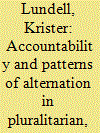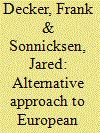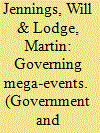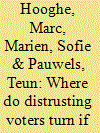| Srl | Item |
| 1 |
ID:
103372


|
|
|
|
|
| Publication |
2011.
|
| Summary/Abstract |
One of the core values in a democracy is the possibility for citizens to bring about alternation in power if they disapprove of the governmental policy. This article examines patterns of alternation and the degree of accountability in three different democratic systems: pluralitarian (characterized by a two-party system), majoritarian (moderately fragmented party system) and consensus (very fragmented party system) democracies. The extent of non-alternation as well as wholesale alternation decreases as we move from pluralitarian to majoritarian and further on to consensus democracy. When alternation is related to election results, majoritarian systems are the most responsive ones, whereas consensus systems generate the lowest degree of accountability.
|
|
|
|
|
|
|
|
|
|
|
|
|
|
|
|
| 2 |
ID:
103376


|
|
|
|
|
| Publication |
2011.
|
| Summary/Abstract |
A successful reform of any system of governance must be well informed of the system's own functional logic. In the context of its democratization, this article explores whether the institutional arrangement of the European Union has developed or behaves more like a presidential than a parliamentary system. Building on that, the authors re-examine the opportunities and feasibility of realizing that model as a step towards more democracy in European governance.
|
|
|
|
|
|
|
|
|
|
|
|
|
|
|
|
| 3 |
ID:
103383


|
|
|
|
|
| Publication |
2011.
|
| Summary/Abstract |
This article argues that radical right parties can be seen as displaying three patterns of opposition towards European integration: rejecting, conditional and compromising. These three patterns are identified through the careful examination of party attitudes on four different aspects related to European integration and the EU. These include the idea of a common identity of European peoples, the principle of cooperation at a European multilateral level, the EU policy practice and the desire to build a future European polity. In light of this conceptualization of radical right opposition to European integration, the article conducts a qualitative analysis of party literature of 12 radical right parties from 10 European countries during the latter part of the 2000s.
|
|
|
|
|
|
|
|
|
|
|
|
|
|
|
|
| 4 |
ID:
103380


|
|
|
|
|
| Publication |
2011.
|
| Summary/Abstract |
Mega-events present a special venue for the practice of risk management. This article analyses the management of security risks in the case of two sporting mega-events, the London 2012 Olympic Games and the FIFA 2006 World Cup in Germany. To what extent do strategies and practices of risk management resemble each other across events? And what explains similarities or differences in the tools of risk management observed in each of these cases? First, this article explores three theoretical explanations for the choice of particular policy tools or instruments. Second, it introduces the tools of government approach as a means of conducting a direct comparative analysis of risk management across political and organizational settings and over time. The tools used for security risk management at the two mega-events are then compared and the different logics of tool choice are evaluated. This analytical approach offers a basis for future comparative inquiry into tools of risk management used in public and private organizations. The empirical findings highlight the particular importance of national political systems in influencing tool choice.
|
|
|
|
|
|
|
|
|
|
|
|
|
|
|
|
| 5 |
ID:
103387


|
|
|
|
|
| Publication |
2011.
|
| Summary/Abstract |
It has been suggested that political distrust is associated with lower levels of voter turnout and increased votes for challenger or populist parties. We investigate the relationship between political (dis)trust and electoral behaviour using the 2009 Belgian Election Study. Belgium presents an interesting case because compulsory voting (with an accompanying turnout rate of 90.4 per cent) compels distrusting voters to participate in elections. Nevertheless, distrusting voters are significantly more inclined to cast a blank or invalid vote. Second, distrust is positively associated with a preference for extreme right (Vlaams Belang) and populist (Lijst Dedecker) parties. Third, in party systems where there is no supply of viable challengers (i.e. the French-speaking region of Belgium), the effect of political trust on party preference is limited. We conclude that electoral effects of political distrust are determined by the electoral and party system and the supply of electoral protest.
|
|
|
|
|
|
|
|
|
|
|
|
|
|
|
|